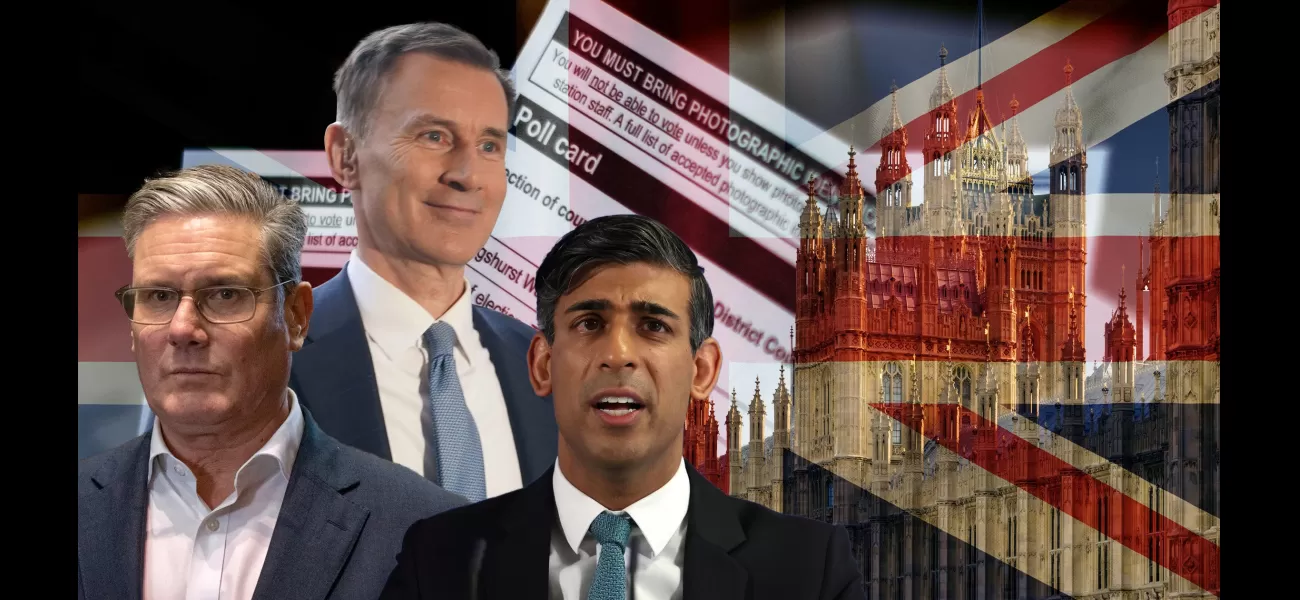Hunt's statement may be a temporary boost before an expected election defeat.
Will Jeremy Hunt's policies help the Conservatives win the election?
November 22nd 2023.

Political leaders are looking to seize the reins of power at the next General Election, with the cost of living being a key battleground. Jeremy Hunt’s Autumn Statement today was an attempt to galvanize the near-flatlining chances of the Tories in the polls, according to seasoned political commentators.
The chancellor outlined his fiscal plans at the House of Commons, announcing measures to stimulate economic growth, increase pay packets and alleviate the cost of living. He also proposed to freeze alcohol duty, increase universal credit and state pensions, as well as introduce 110 measures aimed at growing the British economy. Cuts to National Insurance, freeing up money for rent and new housing, and increasing the National Living Wage to £11.44 an hour were also part of the package. This was one of the Tories’ final big parliamentary set-pieces before the election is called by the prime minister next year.
The speech was designed to appeal to a wide range of British society, underpinned by the Tory ethos of using low taxes and business growth to reinvigorate the country. But will it be enough to raise the Tories’ moribund showing in the polls?
Dr Darren Lilleker, professor of political communications at Bournemouth University, told The Agency: ‘Jeremy Hunt’s Autumn Statement is designed to appeal to electoral groups the Conservatives fear they are losing as they languish in the opinion polls. Larger than expected increases in pensions may shore up support among older generations, especially those most vulnerable to economic volatility, while the drop in the rate of National Insurance, increases in benefits and support for apprenticeships could appeal to voters in the so-called “red wall” seats where many exist in financially precarious conditions.’
The measures come at a time when the Tories have encountered turbulence in recent years, including the Boris Johnson ‘partygate’ scandal, the economic crisis precipitated by Liz Truss and Kwasi Kwarteng and a merry-go-round of firings and hirings. The energy price cap is also expected to rise to around £2,000 for the whole of next year, compounding the cost of living crisis.
The question is whether the statement can reverse the perception of the Conservatives on the economy. The value of the pound has taken hits from Brexit and the Kwarteng budget, meaning import costs have increased, while economic problems resulting from the pandemic, the Russian invasion of Ukraine and turbulence in the Middle East have exacerbated existing problems.
Ideological Conservatives who believe in low tax will find much to like in the budget, but it is only weeks ago that Hunt was saying a responsible government could not reduce taxes and spending needed to be tightly controlled. Will this lead to cynicism and be seen widely as an attempt to win votes at a time of continuing bad news for the government?
Labour leader Sir Keir Starmer is trying to position his party as a credible alternative to 13 years of the Conservatives, with YouGov predicting a small Labour majority as the most likely outcome. A hung parliament resulting in a Conservative-led government or a small Tory majority were both around the 8% mark in the monthly tracking data.
Professor Wyn Grant, emeritus professor of politics, University of Warwick, said: ‘The Autumn Statement might potentially have some impact but one has to remember that in 1997 the economy was recovering and still the Conservatives lost by a large margin because people were worried about public services as well as the state of the economy. It may reduce the Labour lead, but the question is whether it will be enough to secure a Conservative majority, or even the Conservatives as the largest party, and at present I’m quite doubtful about this.’
The impact of the Autumn Statement may not be enough to sway voters at the ballot box, according to political commentators. The Office for Budget Responsibility said that the economy will grow by 0.7% in 2024 and 1.4% in 2025, with no dramatic increase in growth. The Tories may have to wait until after the election to see rosier growth.
It remains to be seen whether Jeremy Hunt’s package of measures will be enough to shift public opinion for the government and to make people feel they are better off. The value of the statement may be short-lived if people still feel they are struggling to make ends meet.
The chancellor outlined his fiscal plans at the House of Commons, announcing measures to stimulate economic growth, increase pay packets and alleviate the cost of living. He also proposed to freeze alcohol duty, increase universal credit and state pensions, as well as introduce 110 measures aimed at growing the British economy. Cuts to National Insurance, freeing up money for rent and new housing, and increasing the National Living Wage to £11.44 an hour were also part of the package. This was one of the Tories’ final big parliamentary set-pieces before the election is called by the prime minister next year.
The speech was designed to appeal to a wide range of British society, underpinned by the Tory ethos of using low taxes and business growth to reinvigorate the country. But will it be enough to raise the Tories’ moribund showing in the polls?
Dr Darren Lilleker, professor of political communications at Bournemouth University, told The Agency: ‘Jeremy Hunt’s Autumn Statement is designed to appeal to electoral groups the Conservatives fear they are losing as they languish in the opinion polls. Larger than expected increases in pensions may shore up support among older generations, especially those most vulnerable to economic volatility, while the drop in the rate of National Insurance, increases in benefits and support for apprenticeships could appeal to voters in the so-called “red wall” seats where many exist in financially precarious conditions.’
The measures come at a time when the Tories have encountered turbulence in recent years, including the Boris Johnson ‘partygate’ scandal, the economic crisis precipitated by Liz Truss and Kwasi Kwarteng and a merry-go-round of firings and hirings. The energy price cap is also expected to rise to around £2,000 for the whole of next year, compounding the cost of living crisis.
The question is whether the statement can reverse the perception of the Conservatives on the economy. The value of the pound has taken hits from Brexit and the Kwarteng budget, meaning import costs have increased, while economic problems resulting from the pandemic, the Russian invasion of Ukraine and turbulence in the Middle East have exacerbated existing problems.
Ideological Conservatives who believe in low tax will find much to like in the budget, but it is only weeks ago that Hunt was saying a responsible government could not reduce taxes and spending needed to be tightly controlled. Will this lead to cynicism and be seen widely as an attempt to win votes at a time of continuing bad news for the government?
Labour leader Sir Keir Starmer is trying to position his party as a credible alternative to 13 years of the Conservatives, with YouGov predicting a small Labour majority as the most likely outcome. A hung parliament resulting in a Conservative-led government or a small Tory majority were both around the 8% mark in the monthly tracking data.
Professor Wyn Grant, emeritus professor of politics, University of Warwick, said: ‘The Autumn Statement might potentially have some impact but one has to remember that in 1997 the economy was recovering and still the Conservatives lost by a large margin because people were worried about public services as well as the state of the economy. It may reduce the Labour lead, but the question is whether it will be enough to secure a Conservative majority, or even the Conservatives as the largest party, and at present I’m quite doubtful about this.’
The impact of the Autumn Statement may not be enough to sway voters at the ballot box, according to political commentators. The Office for Budget Responsibility said that the economy will grow by 0.7% in 2024 and 1.4% in 2025, with no dramatic increase in growth. The Tories may have to wait until after the election to see rosier growth.
It remains to be seen whether Jeremy Hunt’s package of measures will be enough to shift public opinion for the government and to make people feel they are better off. The value of the statement may be short-lived if people still feel they are struggling to make ends meet.
[This article has been trending online recently and has been generated with AI. Your feed is customized.]
[Generative AI is experimental.]
0
0
Submit Comment





